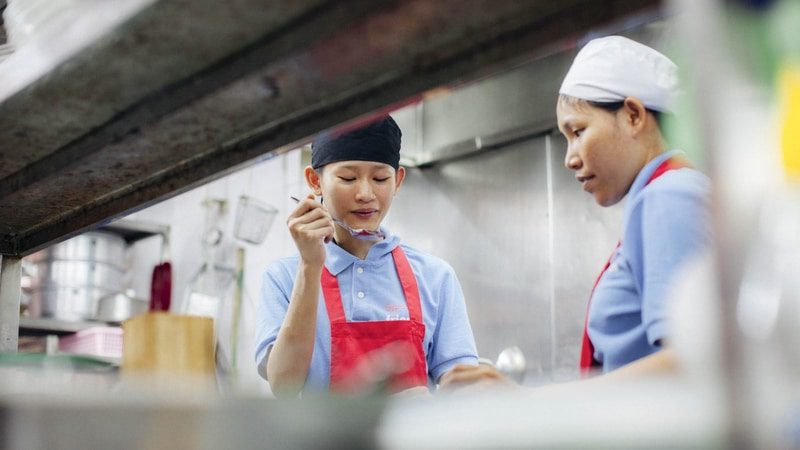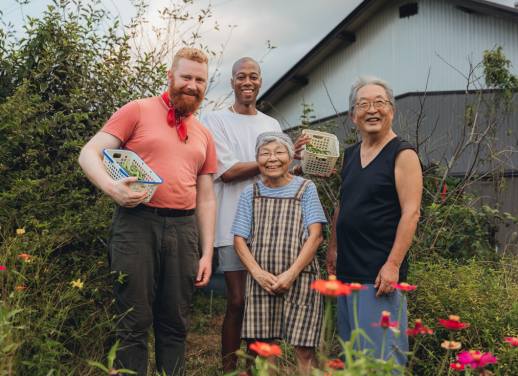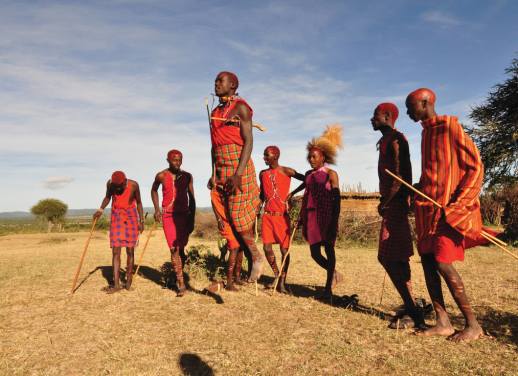What if we told you that you could help 52 at-risk Cambodian youth break the cycle of poverty and build meaningful futures? George Wright pays a visit to an innovative new project—spearheaded by Friends-International and The Intrepid Foundation—that aims to do just that.
This article was originally published on Adventure.com.
In 2006, Ouch Sopheak found himself sleeping rough on the streets of Phnom Penh. He was 14 years old.
Orphaned after his mother and father had passed away when he was young, Ouch briefly moved back to the notorious Stung Meanchey dumpsite—a landfill that people literally lived on—in the Cambodian capital of Phnom Penh, where he was born. Despite lodging with relatives, he was soon forced to leave as the family couldn’t afford to provide for him.
Fast forward to 2018, and I meet Ouch, now 25, in the leafy grounds of Phnom Penh’s Romdeng restaurant. Not too long ago, he spent a stint living homeless just a stone’s throw from here. “When I left home, I stayed on the streets for two or three days, I was just walking around,” he says.
Sadly, Ouch’s story isn’t uncommon in Cambodia. Child protection issues in the country are rife, with an estimated 4,086 homeless children under the age of 18 across the country, and even more living in areas and circumstances that make it impossible for outreach workers to find them, according to a 2017 report. The mean age of these children was a little under eight years old. Another report estimates around 35,000 children live in residential care.
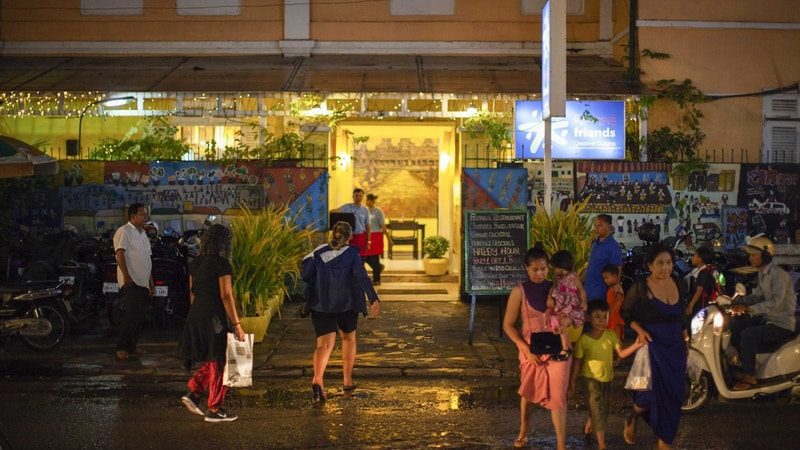
But for Ouch, things are different now. At a loss for what to do after spending days foraging for food, he was struck by some luck that would change the course of his life forever. “I met someone who told me there was an organization that would be able to help me,” he says.
This “someone”—a perfect stranger to Ouch— sent the boy to Mith Samlanh (which means ‘Close Friends’ in Khmer), a project started by Friends-International in Cambodia. It seeks to improve the lives of street-living and working children through vocational training at two of its social enterprise restaurants, Romdeng and Friends the Restaurant.
Ouch enrolled and soon learned the basics of food hygiene and preparation, and was later taught how to run front-of-house. Today, 12 years after finding himself on the streets, he’s the assistant manager at Romdeng.
“It was unbelievable, I got to do things I only dreamed about,” beams Ouch. “On top of helping the restaurant and helping the children, I can show them my experience, what I’ve been through, and the things I’ve learned.”
With aromatic smells emanating from the kitchen to the left of us, Ouch, who speaks with a quiet confidence, is most animated when discussing food—particularly how he perfected some of Cambodia’s best-loved dishes. His favorite? Fish amok, a fragrant, creamy curry steam-cooked in a banana leaf.
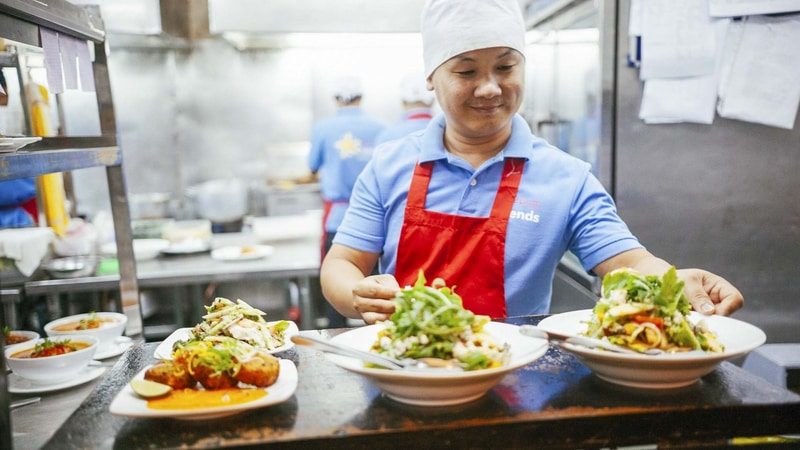
Upon graduating from the program, Ouch began teaching other youngsters who came through Mith Samlanh, many of whom had been sleeping rough, just as he had. From his time in the streets to teaching at Mith Samlanh, Ouch has come a long way. “It was unbelievable, I got to do things I only dreamed about,” he beams. “On top of helping the restaurant and helping the children, I can show them my experience, what I’ve been through, and the things I’ve learned.”
Still, Ouch is realistic, and he has no qualms explaining to the children that things aren’t always going to be easy. “I tell them that life is hard, life is tough,” he says sagely. “I explain to them how to get by on their own and learn to be more patient because I was once there—having nothing, not being able to speak English—but now I’m here, and they can do it too.”
Christine Ege, a project coordinator at Friends-International, arrives at Friends the Restaurant as dozens of chefs and waiters prep for Tuesday lunch. Some of the youngsters here were once sleeping rough on the surrounding streets, just like Ouch.
“It’s for people who want to work in the hospitality industry but might not have the skills or know where to start,” explains Christine about the philosophy behind Mith Samlanh, as the hum of pneumatic drills rattle in the background. “The goal is to help people develop skills and an income, and then help place them in stable employment.”
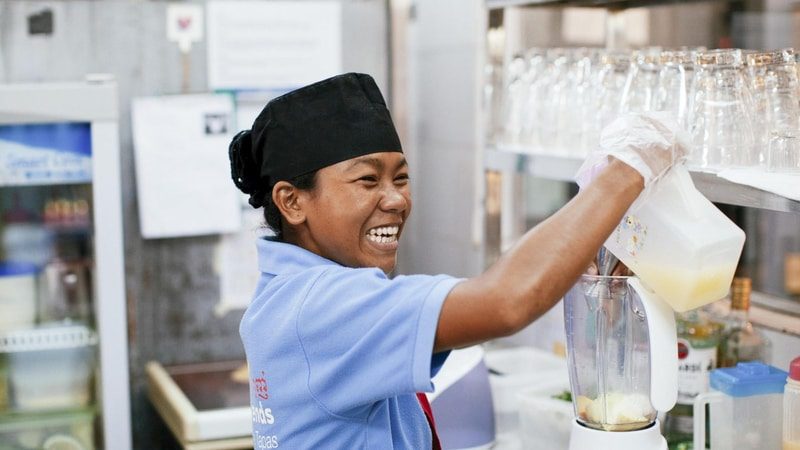
While pneumatic drills are a familiar racket in Phnom Penh, these particular drills are working towards a very specific goal: They’re helping to build the next project by Friends-International Cambodia.
The Futures Factory Project, as it will be known, will aim to provide a safe, welcoming environment in which to mentor, train and upskill at-risk youth in a range of areas, with a view to helping them find meaningful employment. It’s Mith Samlanh, 2.0.
“We want at-risk young Cambodians to have the opportunity to earn a living, to dramatically change their living standards, and for travelers to be able to visit, eat, drink and have a really meaningful experience.”
Robyn Nixon
The ‘factory’, which is situated next to Friends the Restaurant, is still a building site on the day I visit. But come January 2019, it will be bustling with young Cambodians—who’ll be referred to the project by Friends-International—testing out new ideas, learning new things, and gaining the confidence they need to take on the world of work.
Part of the Futures Factory Project will be supported by The Intrepid Foundation—the charitable arm of adventure travel company, Intrepid—by way of a $100,000 grant. The foundation has supported Friends-International Cambodia since 2002 and donors have contributed some $200,000 to help fund initiatives, like Mith Samlanh, along the way.
Last year, those donors helped turn 47 young Cambodians into cooks, motorbike mechanics and beauticians. In 2019, The Intrepid Foundation and Friends-International want to double that figure.
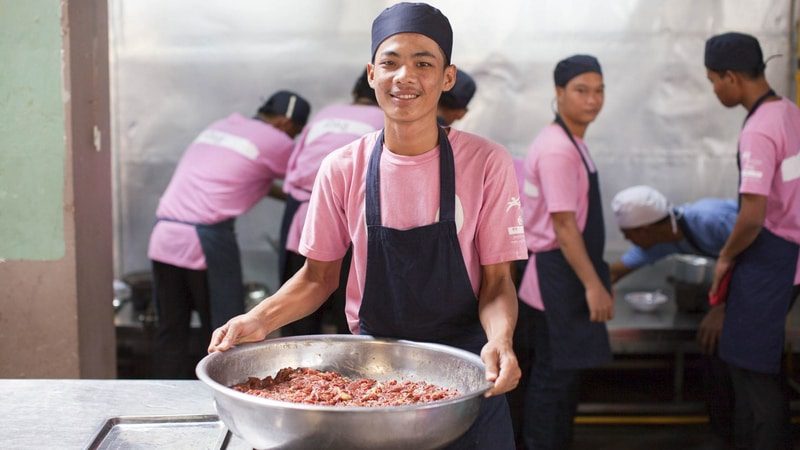
With a focus on cooking training and cocktail experiences, the Futures Factory Project will also welcome tourists to come along and eat food prepared by trainees, learn more about the issues facing young Cambodians, and gain a unique insight into a working social enterprise.
“The Futures Factory Project will help 52 at-risk young Cambodians find employment in the hospitality sector over the next two years,” says Robyn Nixon, general manager of The Intrepid Foundation. “We want them to have the opportunity to earn a living, to dramatically change their living standards, and for travelers to be able to visit, eat, drink and have a really meaningful experience.”
For travelers visiting Cambodia, food and drink experiences won’t get much more local, or authentic, than those on offer at the Futures Factory Project. It will afford visitors unique opportunities to sample cocktails made from fresh, local ingredients, and “enjoy a range of incredible Cambodian dishes,” says Nixon.
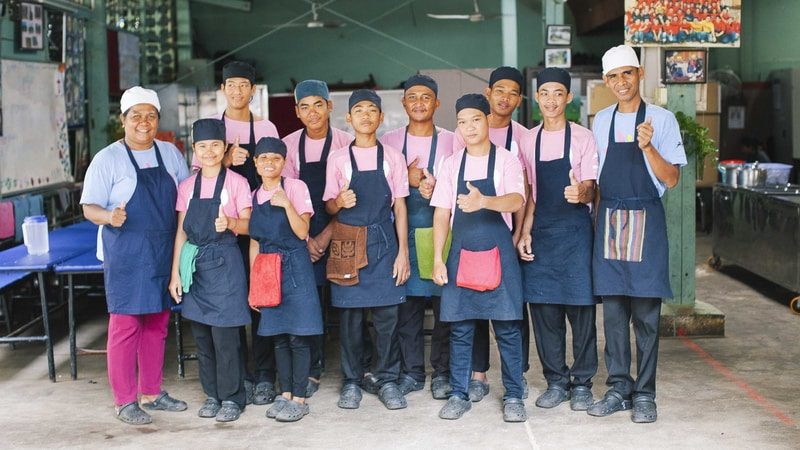
Back at Romdeng, Ouch explains how he will be involved in the Futures Factory Project as part of the ‘Cooking Experience’ program, which will teach both local kids and travelers how to cook traditional Cambodian fare. “We called it ‘Cooking Experience’ rather than ‘Cooking Class’,” he says. “With cooking classes, you only come and cook, but we want visitors to understand our local markets and the source of Cambodian food.”
Looking to the future, Ouch says he wants to one day open his own café to sell cakes and pastries. And after working himself up from the streets of Phnom Penh in little over a decade, he has no reason to doubt himself.
“Without meeting the person who introduced me to Mith Samlanh, I don’t even know what would have happened to me,” he ponders. “I really can’t imagine. I would still probably have been living my life like that.”
Visit The Intrepid Foundation to donate to Friends-International Cambodia and directly help the development of the Futures Factory Project in Phnom Penh.

